ZENGER, John Peter]. The Complaint of James Alexander and William Smith to the Committee of the General Assembly of the Colony of New York &c. [New York: John Peter Zenger, 1736]. Folio (12 5/8 x 8½ in.). Caption title beneath several rows of printers' flowers. As issued: neatly sewn, EDGES UNTRIMMED (last few leaves lightly browned, minor stain to lower corner of first page). A VERY FINE COPY. ZENGER'S EDITION OF THE ORIGINAL COMPLAINT IN THE HISTORIC CASE THAT WAS THE FOUNDATION OF THE STRUGGLE FORFREEDOM OF THE PRESS IN AMERICA The acquittal of Zenger, a New York printer/publisher first established a fundamental principal of law--now axiomatic--that no one can be guilty of libel for speaking the truth. Zenger, who came to New York from the German Platinate, had been apprenticed to the successful New York printer William Bradford He prospered, relocated to Maryland, established his own press, and became the official printer for the colony of Maryland. In 1733 he returned to New York to establish a newspaper, the New-York Weekly Journal , in competition with Bradford's quasi-official Gazette . Zenger received the encouragement and financial backing of a group of New Yorkers who included Chief Justice Lewis Morris James Alexander, William Smith and Cadwallader Colden, who were the leaders of a reform movement opposed to the recently appointed Royal Governor, William Cosby, as imperious, corrupt and tyrannical. The Morrisites--a classic reform party-- described themselves as "the party of the people"; convinced Cosby represented an attempt by the English Parliament to subvert the liberties of the colonists, they called for various reforms: the secret ballot, periodic Assembly elections, reapportionment to reflect population changes and the direct election of sheriffs and other officials. In the municipal elections of 1734, the Morrisites took control of the Common Council. Zenger's Journal comprised the chief mouthpiece of the Morrisite reformers. From its first issue it featured articles, satirical squibs and verse which charged Cosby with corruption, election fraud, influence-peddling and with "setting up personal henchmen with unlawful power to control the judicial system of New York," alluding to Associate Justice James De Lancey, who had allied himself with Cosby. Cosby and De Lancey, stung by these public criticisms, determined to silence Zenger, and Cosby issued a proclamation in November offering a reward for the authors of the "Scandalous, Virulent, False and Seditious Relections." On 17 November, after a grand jury refused to indict Zenger, he was arrested at Cosby's order on a charge of seditious libel. Four particularly offensive issues of Zenger's paper were ordered to be burnt, although the order was forbidden by the alderman. Judge De Lancey set an outlandishly high bail, in order to keep Zenger behind bars. Both the Assembly and Common Council protested, but the case moved to trial, with De Lancey presiding, in August 1735. Initially, Zenger was defended by James Alexander and William Smith (1697-1769). Zenger continued defiantly to publish The New York Weekly Journal by dictating to his wife "thro' the Hole of the Door of the Prison." His lawyers secured a writ of habeus corpus , demanded Zenger's release and questioned the legality of De Lancey's appointment; De Lancey responded by holding Alexander and Smith in contempt of court and having them disbarred for two years, leaving Zenger all but defenseless. It is this summary act of De Lancey that is protested in the present rare pamphlet, circulated by the defiant Zenger in order to keep his case clearly in the public eye. Alexander and Smith later went to Philadelphia and recruited a new attorney to defend Zenger, Andrew Hamilton (d.1741), a brilliant former attorney general, whose career was the origin of the proverbial epithet "Philadelphia lawyer," and who had a reputation for opposing encroachments of civil government. Under English common law, "sed
ZENGER, John Peter]. The Complaint of James Alexander and William Smith to the Committee of the General Assembly of the Colony of New York &c. [New York: John Peter Zenger, 1736]. Folio (12 5/8 x 8½ in.). Caption title beneath several rows of printers' flowers. As issued: neatly sewn, EDGES UNTRIMMED (last few leaves lightly browned, minor stain to lower corner of first page). A VERY FINE COPY. ZENGER'S EDITION OF THE ORIGINAL COMPLAINT IN THE HISTORIC CASE THAT WAS THE FOUNDATION OF THE STRUGGLE FORFREEDOM OF THE PRESS IN AMERICA The acquittal of Zenger, a New York printer/publisher first established a fundamental principal of law--now axiomatic--that no one can be guilty of libel for speaking the truth. Zenger, who came to New York from the German Platinate, had been apprenticed to the successful New York printer William Bradford He prospered, relocated to Maryland, established his own press, and became the official printer for the colony of Maryland. In 1733 he returned to New York to establish a newspaper, the New-York Weekly Journal , in competition with Bradford's quasi-official Gazette . Zenger received the encouragement and financial backing of a group of New Yorkers who included Chief Justice Lewis Morris James Alexander, William Smith and Cadwallader Colden, who were the leaders of a reform movement opposed to the recently appointed Royal Governor, William Cosby, as imperious, corrupt and tyrannical. The Morrisites--a classic reform party-- described themselves as "the party of the people"; convinced Cosby represented an attempt by the English Parliament to subvert the liberties of the colonists, they called for various reforms: the secret ballot, periodic Assembly elections, reapportionment to reflect population changes and the direct election of sheriffs and other officials. In the municipal elections of 1734, the Morrisites took control of the Common Council. Zenger's Journal comprised the chief mouthpiece of the Morrisite reformers. From its first issue it featured articles, satirical squibs and verse which charged Cosby with corruption, election fraud, influence-peddling and with "setting up personal henchmen with unlawful power to control the judicial system of New York," alluding to Associate Justice James De Lancey, who had allied himself with Cosby. Cosby and De Lancey, stung by these public criticisms, determined to silence Zenger, and Cosby issued a proclamation in November offering a reward for the authors of the "Scandalous, Virulent, False and Seditious Relections." On 17 November, after a grand jury refused to indict Zenger, he was arrested at Cosby's order on a charge of seditious libel. Four particularly offensive issues of Zenger's paper were ordered to be burnt, although the order was forbidden by the alderman. Judge De Lancey set an outlandishly high bail, in order to keep Zenger behind bars. Both the Assembly and Common Council protested, but the case moved to trial, with De Lancey presiding, in August 1735. Initially, Zenger was defended by James Alexander and William Smith (1697-1769). Zenger continued defiantly to publish The New York Weekly Journal by dictating to his wife "thro' the Hole of the Door of the Prison." His lawyers secured a writ of habeus corpus , demanded Zenger's release and questioned the legality of De Lancey's appointment; De Lancey responded by holding Alexander and Smith in contempt of court and having them disbarred for two years, leaving Zenger all but defenseless. It is this summary act of De Lancey that is protested in the present rare pamphlet, circulated by the defiant Zenger in order to keep his case clearly in the public eye. Alexander and Smith later went to Philadelphia and recruited a new attorney to defend Zenger, Andrew Hamilton (d.1741), a brilliant former attorney general, whose career was the origin of the proverbial epithet "Philadelphia lawyer," and who had a reputation for opposing encroachments of civil government. Under English common law, "sed

.jpg)


.jpg)


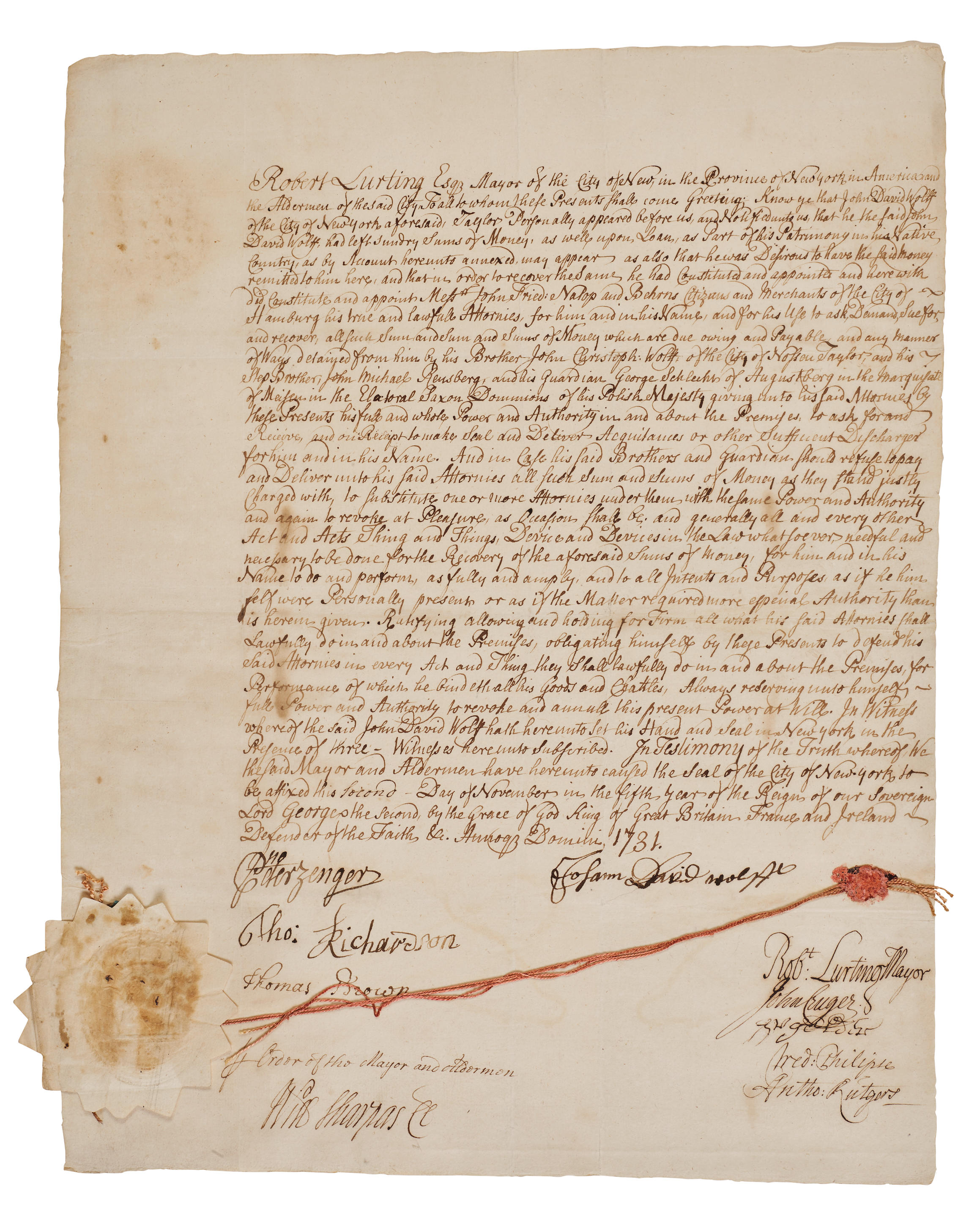
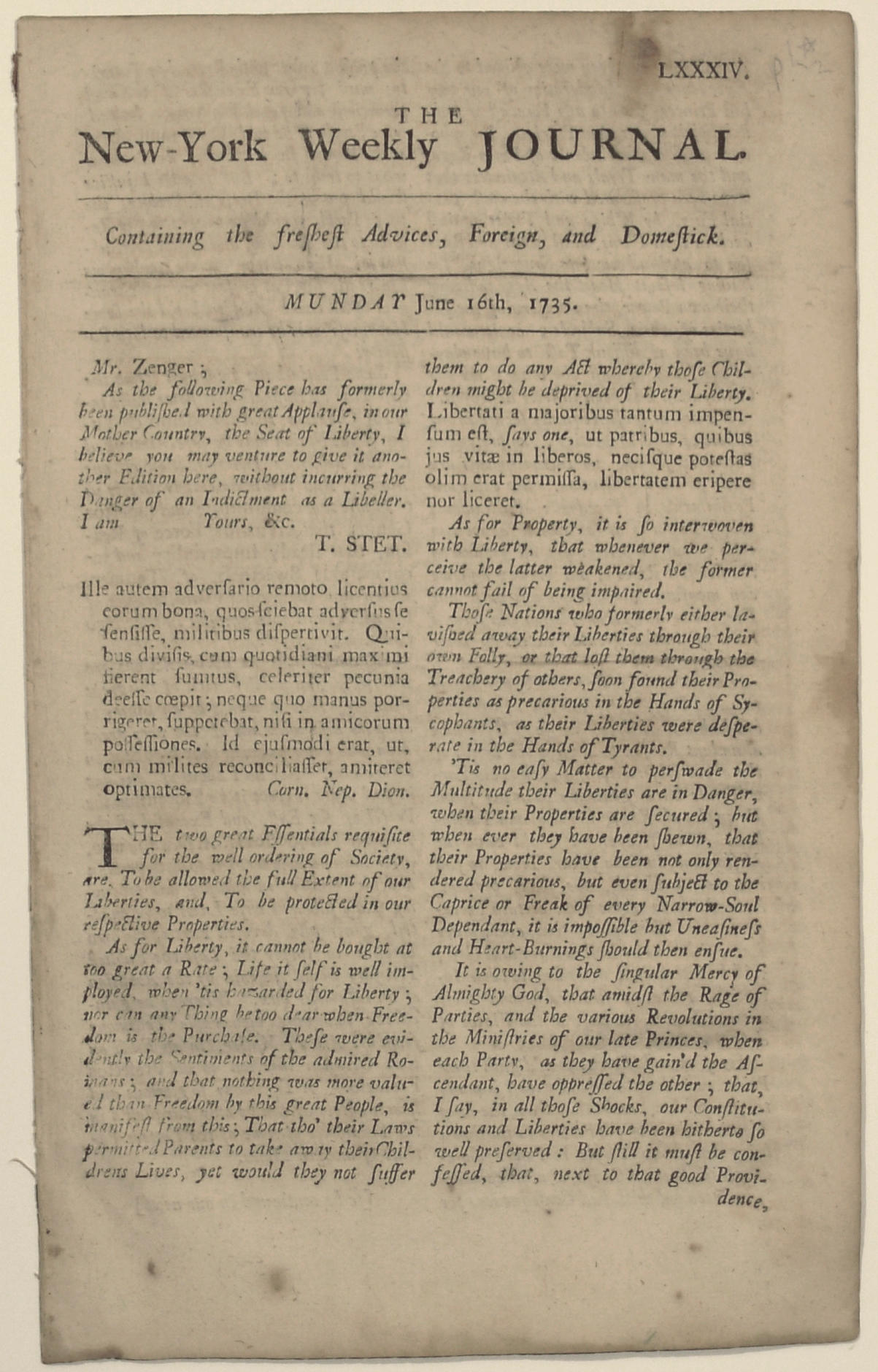
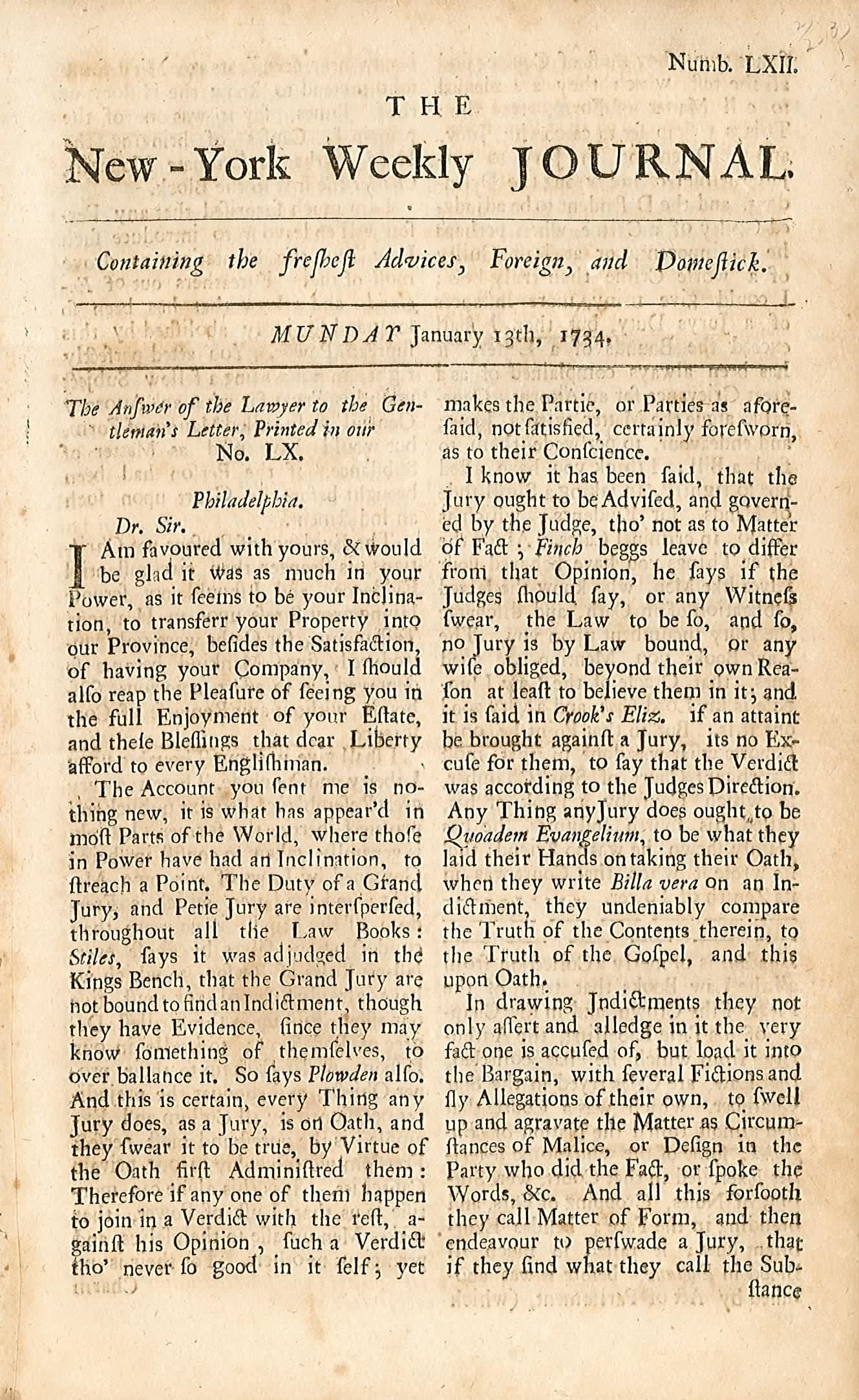
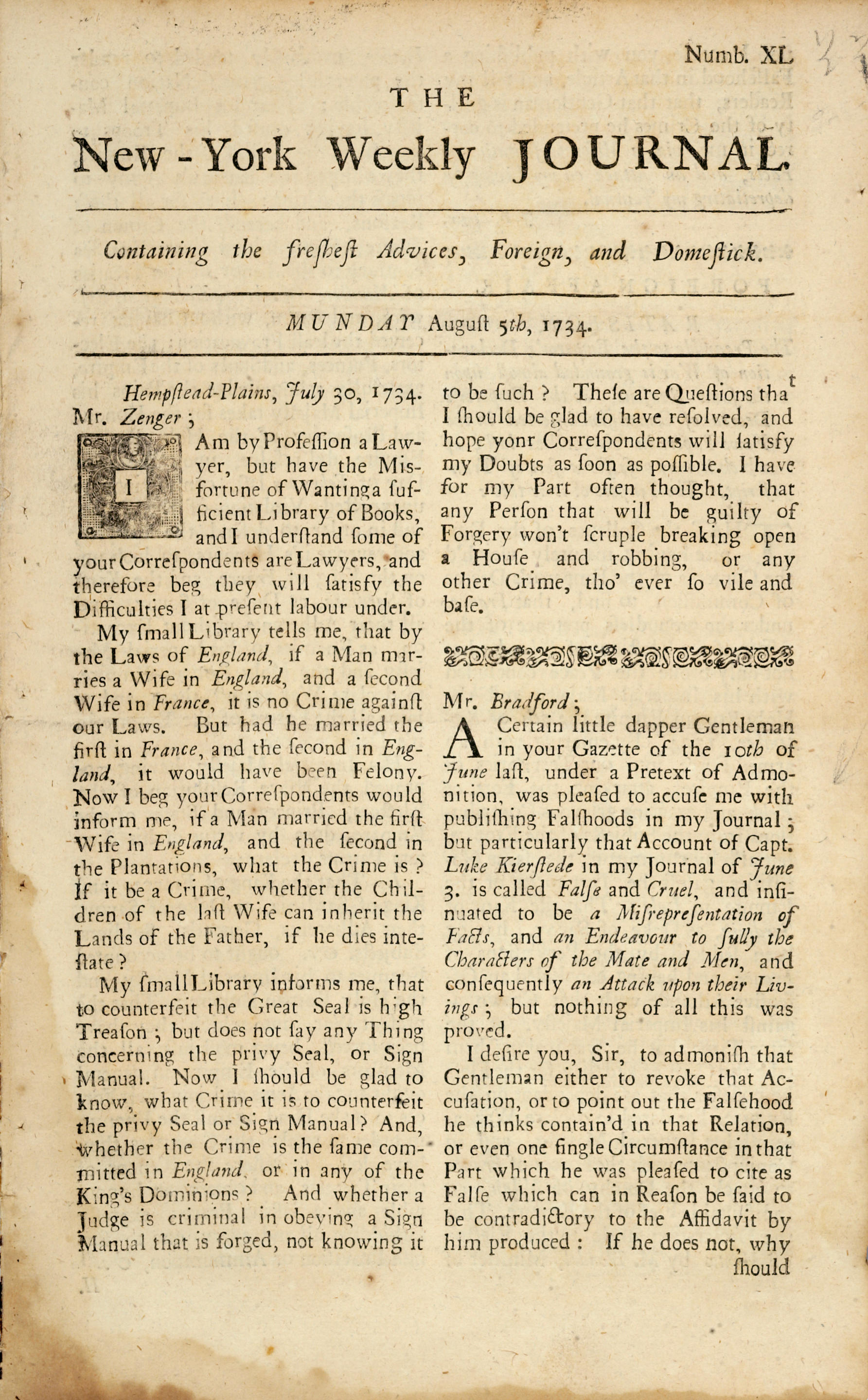
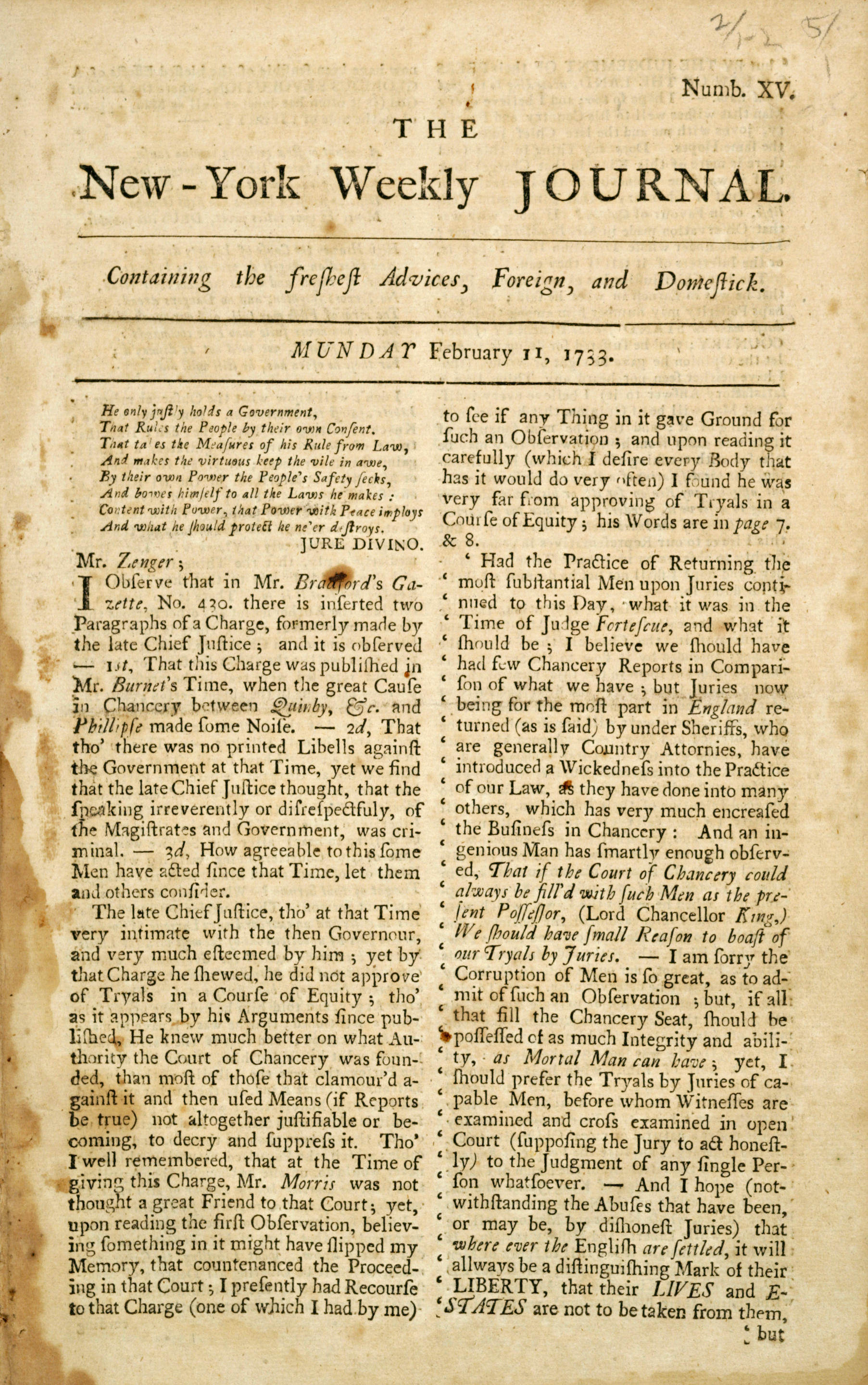
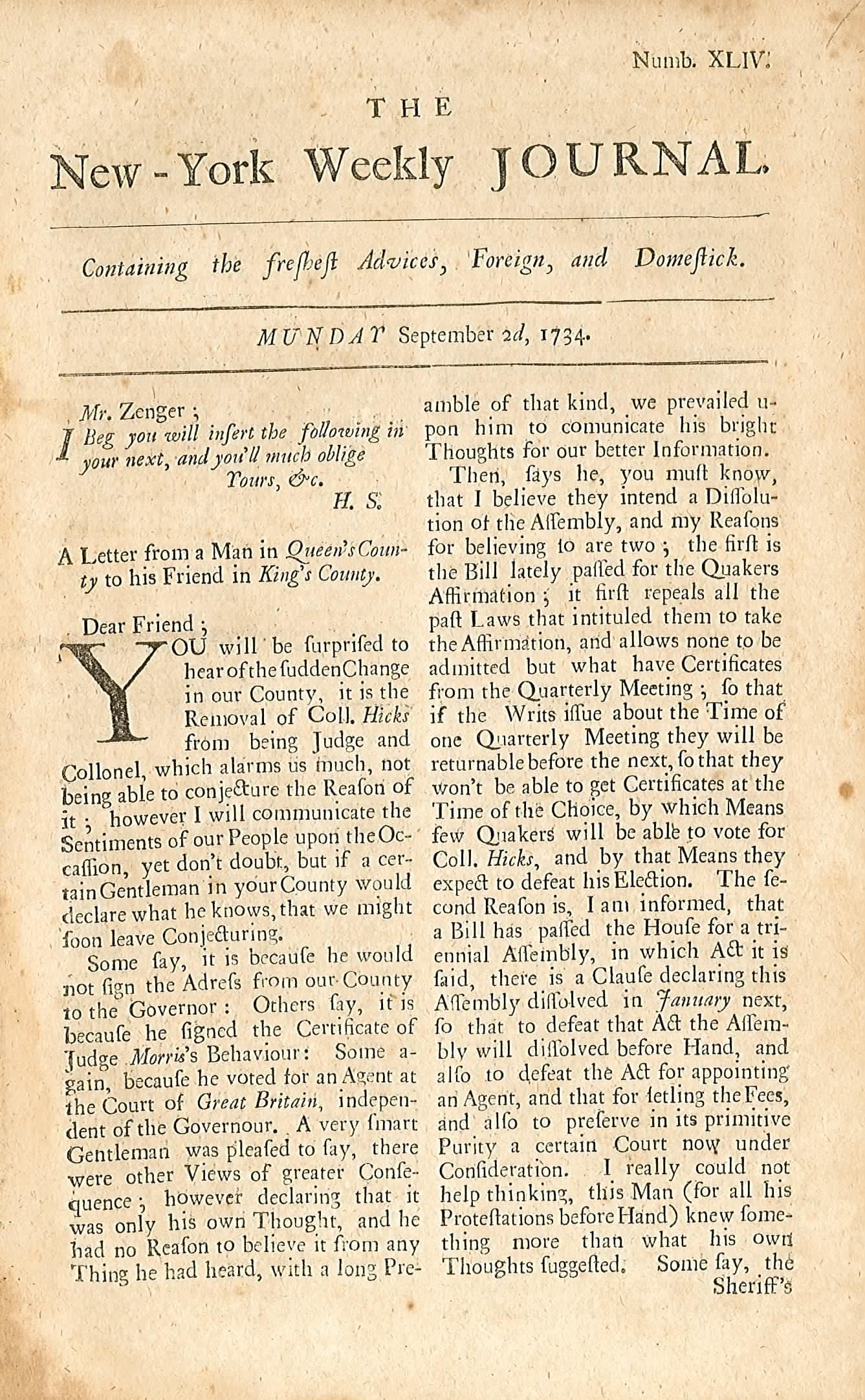
Testen Sie LotSearch und seine Premium-Features 7 Tage - ohne Kosten!
Lassen Sie sich automatisch über neue Objekte in kommenden Auktionen benachrichtigen.
Suchauftrag anlegen